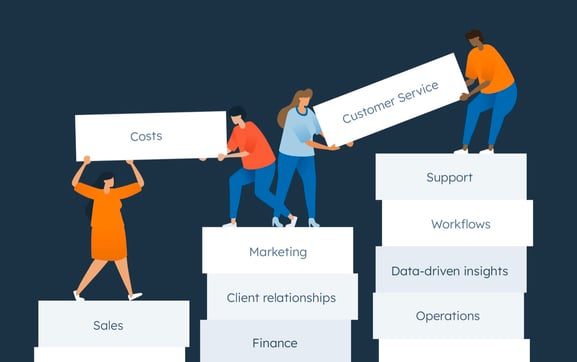The concept of Revenue Operations (“RevOps” for short) has been gaining traction in recent years as businesses try to maximize efficiency. From startups to established enterprises, RevOps has been a game changer for companies that have previously struggled to align the varying activities of internal teams into a more unified organizational goal.
Briefly put, RevOps is a combination of various functions that use data-driven insights to drive growth. An effective RevOps strategy allows multiple teams to organize and coordinate all efforts concerned with addressing the customer at every stage of the customer journey.

As such, a good Revenue Operations Manager can make all the difference for your business. They are the linchpin that connects the dots and ensures a seamless customer experience from start to finish.
RevOps Managers understand how to take a holistic view of the entire revenue stream and ensure all aspects of it—from marketing to sales, support, and beyond—are connected efficiently.
The right person in this role can help you unlock the potential of what your business can achieve.
Let’s look at how a good RevOps Manager can help grow your business.
What is RevOps?
Firstly, what does Revenue Operations mean, exactly?
Revenue Operations is a streamlined organizational approach that combines sales, marketing, finance, operations, and customer success teams under the same umbrella.
By fusing their collective knowledge through shared goals, incentives, and processes, RevOps helps maximize business growth by fostering better communication and collaboration across all departments.
Whereas traditional business models typically take a more segmented approach toward operations, often leading to misaligned goals and wasted resources, RevOps seeks to find a better, more sustainable balance between multiple departments.
At its core, RevOps applies data-driven insights to ensure that all customers have a comprehensive experience with the business—from acquisition to satisfaction and growth. Through this approach, RevOps seeks to eliminate any gaps or inefficiencies due to miscommunication or lack of real-time feedback from customer interactions.
If it all sounds too challenging, that's because it is. When implemented correctly, however, a RevOps framework can spell the difference between a business thriving or floundering. Finding a great RevOps manager starts by understanding the role accurately and knowing what constitutes a great RevOps strategy.
Some of the most common challenges that most businesses encounter when it comes to implementing RevOps are:
- A lack of strategy: The problem with most businesses is that they are focused on short-term gains and optimizations instead of taking the time to develop a long-term strategy
- Not having the right tools: Tracking progress and evaluating success can be difficult without the right technology. CRMs like Hubspot can be incredibly helpful in connecting all departments and creating an environment of data-driven insights.
- Hurdles in the buying process: Gaps in communication and implementation between internal teams can often lead to inefficient processes that may hamper a smooth customer journey (e.g., unnecessary steps during checkout, annoying popup ads, repetitive registration)
What does a RevOps manager do?
A RevOps manager essentially coordinates between various teams to maximize revenue growth by setting up clear, streamlined workflows, identifying tools that will drive sales and cut losses, prioritizing client relationships, and creating a customer-centric culture.
The primary goal of a RevOps team is to find ways to be more cost-efficient by improving data accuracy and automating workflows, wherever applicable. As such, gaps between departments are identified and addressed, thereby increasing efficiency and optimizing profits.
RevOps teams often perform “business advisor” roles because they can set strategies and steer all four areas of revenue operations toward a common goal.
It simplifies processes while centralizing data to unlock the fullest potential of revenue for a business. Rather than individual silos operating separately from one another, RevOps transforms them into one efficient revenue-generating machine.
In short, the goal of a RevOps manager is to create a unified environment for sales and marketing teams and ensure that all customer-facing departments are working with the same data, tools, processes, and goals to achieve revenue growth.
RevOps has one essential purpose: To ensure that an organization is set up for consistently positive customer experiences and growth opportunities. This framework gives the power to review, alter, and enhance every element of the customer journey, harmonize internal processes, and ensure objectives across all teams are in sync.
The outcome? Seamless transparency, productivity, and unity throughout departments and platforms.
The Benefits of RevOps Management
How does a RevOps framework drive business growth? RevOps can bring several benefits to a business, including increased sales and customer retention, more efficient use of resources, better performance measurement, and visibility into operations.
Data-driven insights
A cornerstone for achieving RevOps success is ensuring everyone on your team is on the same page regarding data. This may require you to take a step back and survey the whole customer journey in its entirety. To ensure accuracy, cleaning up irrelevant or duplicate processes is essential. And while it can be tedious work, doing so will provide tremendous rewards when completed.
A great RevOps manager will know how to use this data to uncover insights about your customer base and how they interact with your product or service. Data-driven insights are essential for any business that wants to remain competitive in its industry.

By analyzing customer data, trends, and customer feedback, a good RevOps Manager can develop strategies that will help boost customer acquisition and retention rates. This information is invaluable for making informed decisions about the direction of your company.
Through a RevOps strategy, marketing, sales, and customer success teams can all benefit from the same centralized database and tech stack. This unified method of data storage will not only allow for better interdepartmental collaboration, but also drastically reduce any potential inconsistencies in the data.
Revenue Optimization
In addition to providing data-driven insights, an excellent RevOps manager can also optimize your revenue stream. They understand how different tactics like pricing changes or promotions might affect sales and will be able to identify opportunities to maximize revenue without sacrificing quality or reputation.
They can also identify cost savings within the system, such as reducing wasted resources or improving operational efficiency. Optimizing RevOps with data-driven solutions and processes also allows you to gauge and maximize revenue growth accurately.
Ultimately, a streamlined customer journey and sales pipeline will help identify opportunities for new strategies, fostering predictable business expansion over time. If your customers are satisfied with their journey, you'll see lower churn rates, more referrals and loyal customers, and higher CLVs (customer lifetime values).
Better and faster decision-making
RevOps allows all your teams to work together to take the guesswork out of decision-making. With the right data and insights, everyone can make better decisions faster. This collaborative approach helps meet customer-centric goals without sacrificing speed or efficiency.
A RevOps manager establishes performance metrics that give visibility into operations and customer insights. This allows teams to make more accurate predictions, anticipate customer needs and preferences, and quickly respond to changing conditions in the market.
By creating a culture that values data-driven decision-making, businesses can better manage customer expectations, build trust with partners and customers, reduce operational costs, and ultimately increase revenue.
Improve customer retention
To keep customers around, you must create a pleasant and positive experience. An effective RevOps manager ensures that all teams connected with the customer are in sync, talking efficiently and working together to provide an unblemished journey from start to finish. This means marketing can pass leads along to sales while customer success happily takes over after their job is done.
Ensuring everyone involved in the customer experience shares a common set of expectations and performance metrics allows for authentic relationships to form, reducing pain points and deepening everyone's understanding of what the customers truly need.
Understand your target audience better
A business needs to thoroughly understand its target audience before it can effectively market and sell to them or gain their loyalty. A good RevOps manager ensures that the data in a business's customer relationship management (CRM) software is accurate, up-to-date, and accessible to all shareholders.
Approaching customer relations through a unified and data-driven approach is the key to collecting valuable insights and customer data across multiple channels. This task can be challenging and sometimes even impossible without a cohesive approach, causing valuable leads to fall through the cracks or weakening customer relationships.
With a RevOps framework, customer relations can be fortified by addressing hurdles in the customer journey and ensuring each customer has a unique experience. The end result is more effective lead generation, higher customer satisfaction, increased loyalty, and better retention rates.
Enable scalable personalization
Personalization plays a crucial role in the customer experience—it allows marketers to establish meaningful connections with potential buyers and make them feel understood and valued. However, crafting a personalized customer experience is a tremendous endeavor, especially when you need to do it at scale. Even the most effective marketing teams can't single-handedly make this happen.
A smart RevOps manager can automate personalization efforts without sacrificing content quality or losing the brand's voice. By using streamlined, scalable processes, RevOps teams leverage the benefits that personalization offers, allowing businesses to foster better customer relations and engage with target audiences effectively.
Strategic planning & execution
Finally, an excellent RevOps manager will have experience in strategic planning and execution, which are both critical for any growing business. They should be able to identify goals and create plans to help you reach them quickly and efficiently while staying within budget constraints.

They should also have experience managing teams to ensure everyone is working towards the same goal while meeting deadlines and staying on task throughout the process. Rolling out a RevOps strategy for the first time can be challenging, but with a great manager and team in place, you can:
- Automate workflows and speed up business-as-usual (BAU) procedures
- Eliminate duplicate processes
- Spend less time on administrative tasks and more time on business-critical functions
Strategies for picking the best tech stack for RevOps
According to a recent HubSpot report, an impressive 61% of B2B firms that utilize automation technologies within their sales processes have seen remarkable increases in revenue operations.
Deciding on the perfect tech stack is imperative to scale your RevOps plan and propel sales. Though initially intimidating, this step will be essential for a successful business strategy.
 RevOps employs technology to support the customer journey across all touchpoints, allowing businesses to unlock more revenue potential. As such, most managers find a technological audit imperative to assess whether the current tech stack is sufficient or if there are any capabilities they should add or remove.
RevOps employs technology to support the customer journey across all touchpoints, allowing businesses to unlock more revenue potential. As such, most managers find a technological audit imperative to assess whether the current tech stack is sufficient or if there are any capabilities they should add or remove.
When selecting a tech stack, focus on solutions that have features specifically designed to improve customer relationships. Once you've evaluated your business processes, gather all relevant data, including existing tools and potential ones that need to be part of your revenue tech stack.
Then, map out crucial RevOps functions and carefully assess which tools best fit the job. It's important to consider existing integrations, scalability, and customer support. As a rough guideline, your audit should allow you to form a list of the following:
Customer Relationship Management (CRM) Software
Reliable CRM software is crucial to an effective RevOps strategy. The best CRM for RevOps allows you to centralize customer data, analytics, and other platforms to help you access it all in one place.
HubSpot, for example, is a marketing, sales, and service platform that helps businesses attract customers, increase conversions, and retain customers. With a unified codebase, a single source of truth, and an intuitive user experience, HubSpot is a trusted CRM among many RevOps teams.
Revenue Intelligence Software
Harnessing the power of artificial intelligence (AI) and machine learning (ML), Revenue Intelligence software optimizes data gathering, management, and synchronization throughout all customer-facing activities.
Revenue intelligence software is a game changer for RevOps as it eliminates manual, siloed data entry that usually causes miscommunications and wasted leads. It automates data capture across each touchpoint, allowing teams better access to accurate and reliable insights when needed.
Project Management Tools
Collaboration is essential in any RevOps strategy, and various tools are available to simplify it. Project management software can help teams collaborate on tasks more efficiently and keep everyone organized.
These tools are excellent for tracking deadlines, setting goals, assigning responsibility to team members, and creating structured workflows. Project management tools have proven helpful across on-site and remote teams, facilitating better, more agile real-time collaboration.
[Search over 1,000 apps that integrate with HubSpot to help improve your RevOps]
Visit the HubSpot App Marketplace
Conclusion
Having an experienced RevOps manager is essential for any business looking to unlock its potential for growth in today's highly competitive market. A good RevOps manager should:
- Be well-versed in data analysis so they can provide meaningful insights about customers that can inform decision-making processes at all levels of the business
- Have expertise in revenue optimization to get maximum return on investment
- Know how to plan strategically and execute effectively to stay one step ahead of the competition
- Be confident in selecting the right tech stack to ensure all customer-facing activities work together seamlessly
You'll be well equipped to maximize ROI and boost the business's bottom line by conducting a thorough audit of your current technologies and researching potential new tools to add to your revenue operations stack. With the right strategy in place, you'll be able to build strong customer relationships, increase lifetime value and maximize revenue.





